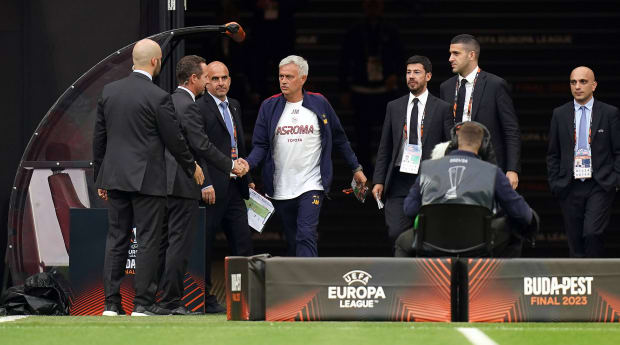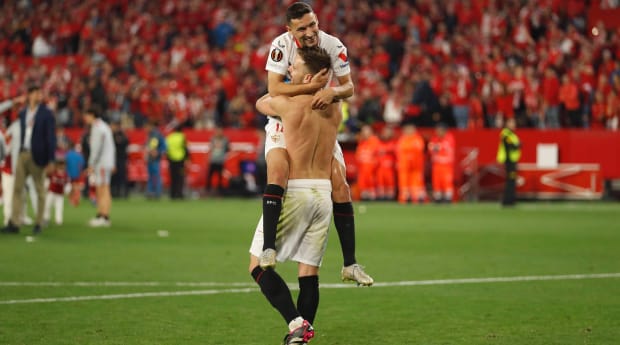In July 2013, a couple of months after Chelsea had beaten Benfica in the Europa League final, José Mourinho, who had by then succeeded Rafa Benítez as Chelsea manager, scoffed at his predecessor.
“I don’t want to win the Europa League,” he said. “It would be a big disappointment for me. I don’t want my players to feel the Europa League is our competition.” Ten years later, Mourinho is in no position to be picky about which European final he is in.
It is 20 years since Mourinho first made his first major impression on European football, as his Porto beat Celtic 3–2 in the final on a night of almost operatic drama in Sevilla. He was 40, dashingly handsome and possessed of a dark charisma that meant his every utterance was pored over to see whether it might be part of some web of Machiavellian intrigue to gain some future psychological advantage. In the decade that followed, he added a further six league titles in four countries (he had already won one in Portugal), as well as winning the Champions League with Porto and Inter, achievements that look all the greater now in an era in which success is the preserve of the megarich.

IMAGO/PA Images
“As a player, you use your body, and your body does not respond the same way when you are 30 as when you are 40,” Mourinho said. “As a coach, your brain becomes sharper, and the accumulation of knowledge is better with the years. You stop when you lose motivation, which is not the case. My motivation goes up every day. So I think I am better now.”
In the past decade, though, Mourinho has won just one more league title. A third Champions League has so far eluded him. But he did win the Europa League with Manchester United—meaning he could become the first manager to win the UEFA Cup/Europa League with three different clubs—and the inaugural Conference League last season with Roma (meaning he is the only manager to have won all three current UEFA competitions).
His star has fallen through those grim final months of his second spell at Chelsea and then disappointing spells at United and Tottenham; Roma has a proud history, but can in no way be considered among the very elite. It’s not even listed among the top 30 richest clubs by revenue in the latest Deloitte report into football finance. A sixth-place finish last season looks likely to be repeated this year.
And while Paris Saint-Germain is reportedly interested in appointing Mourinho in the summer, it feels now as though this is Mourinho’s level, just outside the elite, still railing against the world, still devastating opponents with acerbic put-downs, still able to make his mark. “My future?” he said Tuesday in an answer that seemed typically calculated to create an effect. “I spoke with the two captains of my team because they asked me about it. I gave them an objective answer. But it’s something that stays between me and the team. They know what I’ll do.”
His shtick has always been as the outsider, the rebel taking on the elite, and that is a hard act to pull off when he’s in charge of Real Madrid or United. When his Roma grinds out a 0–0 at Bayern Leverkusen to win the semifinal (one shot to 23, 28% possession, xG of 0.03, ball in play for 54 of the 104 minutes), it is just Mourinho doing his thing; do that with Madrid or United and it feels vaguely distasteful. With their resources, they should be able to play the game in a more engaging way.

IMAGO/AFLOSPORT
Between Mourinho and a sixth European success stands Sevilla. It may have had a dismal start to the season—it lies ninth in La Liga thanks largely to a sudden improvement under José Luis Mendilibar was appointed as manager in March to replace Jorge Sampaoli.
“It is true that they were not doing well,” Mendilibar said. “The situation was not good. They were not comfortable with how they trained and how they played. And in that sense it was easier for us. I don’t know if we gave them normality, simplicity, ease. …
“Then the results helped us. Playing so many games in such a short time helped us that almost everyone will play and feel integrated.”
For Sevilla, being in a Europa League final feels normal. The Europa League is Sevilla’s tournament. It has won it six times since 2006, twice as many as any other club has won it in the competition’s entire history. It has never lost in a European final, but neither has Mourinho. On Wednesday in Budapest, something will have to give.







